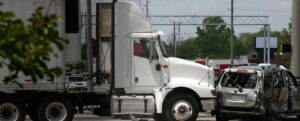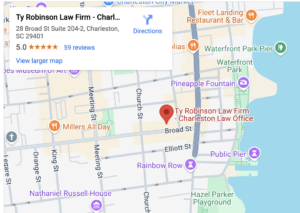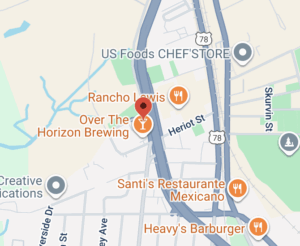
Truck accidents in Charleston, SC, often lead to devastating injuries, significant financial losses, and emotional trauma. At Ty Robinson Personal Injury & Car Accident Law Firm, our dedicated Charleston truck accident lawyer is committed to helping our injured clients. Contact us today for a free consultation at (843) 278-2222.
We hold negligent parties accountable and recover the compensation they deserve. If you or a loved one has been injured in a truck accident, our experienced legal team is here to guide you through the complex legal process.
With years of experience and a track record of proven success, we won’t rest until you get the justice you need.
How Ty Robinson Personal Injury & Car Accident Law Firm Can Help After a Truck Accident in Charleston, South Carolina

Truck accidents frequently occur on Charleston’s busy highways and streets. Unfortunately, due to the size and weight of commercial trucks, these accidents often result in catastrophic injuries to those in smaller vehicles.
Trucking companies and their insurers often deploy aggressive tactics to minimize their liability and reduce the compensation owed to victims. At Ty Robinson Law Firm, we are prepared to counter these strategies by:
- Conducting comprehensive investigations: We gather evidence, analyze crash reports, and work with accident reconstruction experts to determine the cause of the collision.
- Identifying liable parties: Liability may extend beyond the truck driver to include the trucking company, cargo loaders, or maintenance providers.
- Negotiating with insurance companies: We protect your rights and advocate for the full value of your claim.
- Litigating when necessary: If negotiations fail, we are prepared to take your case to court and fight for justice.
Our goal is to secure maximum compensation for your injuries and losses. We will work diligently to give you the financial stability you need to recover from your accident. Contact us today to begin with a free consultation with a personal injury attorney in Charleston, SC.
What Is My Truck Accident Case Worth?

The value of your case depends on several factors.
Working with our Charleston truck accident lawyer can help you determine the full extent of your case value.
We will evaluate factors like:
- The severity of your injuries
- The cost of current and future medical treatment
- Lost wages and diminished earning capacity
- Pain, suffering, and emotional distress
- The impact the injury has had on your quality of life and relationships
At Ty Robinson Law Firm, our truck accident law firm thoroughly evaluates each case to determine its full worth. We will work tirelessly to ensure that you receive the compensation you need to rebuild your life.
What Damages Can Truck Accident Victims Recover in South Carolina?

Under South Carolina law, truck accident victims may recover both economic and non-economic damages. These categories of damages fall under the broad category of compensatory damages. The goal of compensatory damages is to provide financial reimbursement for the actual losses you suffer in an accident.
Economic damages are readily ascertainable because they are based on the concrete losses you suffer. Economic damages can provide compensation for tangible losses like:
- Medical expenses, including hospital stays, surgeries, and rehabilitation
- Lost wages and loss of future earning capacity
- Property damage
- Long-term care costs
Non-economic damages are not as easy to ascertain because they are supposed to compensate you for intangible losses. Examples of non-economic damages include:
- Pain and suffering
- Emotional distress
- Loss of enjoyment of life
- Loss of companionship or consortium
In cases of gross negligence or reckless conduct, you may be able to seek punitive damages. Punitive damages are rare. This is because they are only awarded in cases where the court seeks to punish the at-fault party and deter similar behavior in the future.
Our truck accident attorney will explore every avenue to recover the full range of damages available under South Carolina law. Make sure to discuss the damages available in your case during your free initial case review.
How Much Does It Cost to Hire a Truck Accident Lawyer?

At Ty Robinson Law Firm, we believe that everyone deserves access to quality legal representation. Your financial circumstances shouldn’t matter when it comes to seeking help with a truck accident case. We stand by a promise to make the justice system affordable and accessible to our clients. That’s why we operate on a contingency fee basis.
This fee arrangement means that you are not responsible for upfront costs or fees. That’s right – you pay us nothing to begin working on your case. We also don’t charge you a single penny unless we win your case. We only get paid when we secure compensation on your behalf.
This fee arrangement allows you to focus on your recovery without worrying about legal fees. After a serious truck accident, you should be able to focus on your health while your attorney fights the legal battle on your behalf.
Can I Recover Compensation If I’m Partially at Fault?

South Carolina follows a modified comparative negligence rule. This rule means that you can recover compensation as long as you are less than 51% at fault for an accident. If you are more than 50% responsible for a truck accident, you could be barred from recovering compensation.
On the other hand, if you are less than 51% liable, you can still seek damages. However, your compensation will be reduced by your percentage of fault. For instance, if you are 25% responsible for the crash, and your damages total $100,000, you would only receive $75,000.
Our truck accident legal team is skilled at countering attempts to unfairly shift blame onto victims. This is a common practice for insurance companies and the trucking companies they represent. We are prepared to defend against these blame-shifting tactics while still fighting to protect your legal rights and interests.
Common Truck Accident Injuries

Truck accidents can cause severe, life-altering injuries. The sheer size and weight of commercial trucks can completely destroy cars and other smaller vehicles during a collision. The drivers and passengers in smaller vehicles often suffer catastrophic injuries as a result. Our Charleston truck accident lawyer has helped clients who have suffered from a wide range of injuries stemming from accidents. These injuries have included:
- Traumatic brain injuries (TBIs)
- Spinal cord injuries
- Paralysis
- Broken bones
- Internal organ damage
- Severe burns and lacerations
- Amputations
- Nerve damage
- Wrongful death
If you’ve suffered any of these injuries, our compassionate legal team will advocate for the compensation you need for your medical care and recovery. If you have tragically lost a loved one to a trucking accident, we will come alongside your family to help you seek justice for your loss.
Causes of Truck Accidents in Charleston, South Carolina

Truck accidents often result from negligence on the part of truck drivers, trucking companies, or other parties. The sad reality is that many of these accidents could have been prevented with ordinary diligence. Common causes of truck accidents in Charleston include:
- Driver fatigue: Long hours behind the wheel can lead to exhaustion and slower reaction times.
- Distracted driving: Texting, phone use, or other distractions can cause serious accidents.
- Driving under the influence: Alcohol or drug use impairs judgment and coordination.
- Speeding and reckless driving: Excessive speed or unsafe lane changes can lead to collisions.
- Improperly secured cargo: Shifting or falling cargo can cause accidents.
- Poor maintenance: Failing to maintain brakes, tires, or other critical systems can lead to mechanical failures.
At Ty Robinson Law Firm, our dedicated attorney will investigate the circumstances of your accident. We will identify all liable parties and hold them accountable for your injuries. Once we complete our investigation, we will take the fight directly to the large truck companies and insurance companies. We won’t back down or settle for less than our clients need.
How Long Do I Have to File a Truck Accident Case in South Carolina?

In South Carolina, the statute of limitations for personal injury cases is generally three years from the date of the accident. There are certain exceptions which may or may not apply to your case. Regardless, it is never a wise decision to wait or delay taking action.
Filing within the statutory time frame is critical to preserving your right to compensation. Delaying your case could result in the loss of valuable evidence and the weakening of witness testimony. Make sure to give your case the best chance of success by consulting with an attorney as soon as possible. Our Charleston truck accident law firm will ensure that you comply with all legal deadlines so you can rest assured that your case is handled timely.
Contact Ty Robinson Personal Injury & Car Accident Law Firm, For a Free Consultation
A truck accident in South Carolina can upend your life in an instant. At Ty Robinson Personal Injury & Car Accident Law Firm, our Charleston truck accident lawyer is committed to helping you seek justice. Our main focus is securing the compensation you deserve for your injuries.
Contact us today or visit our website to schedule a free consultation. We are here to answer your questions, explain your rights, and guide you through the legal process. With our firm, you don’t pay a cent unless we win your case. You have nothing to lose, so don’t delay.



